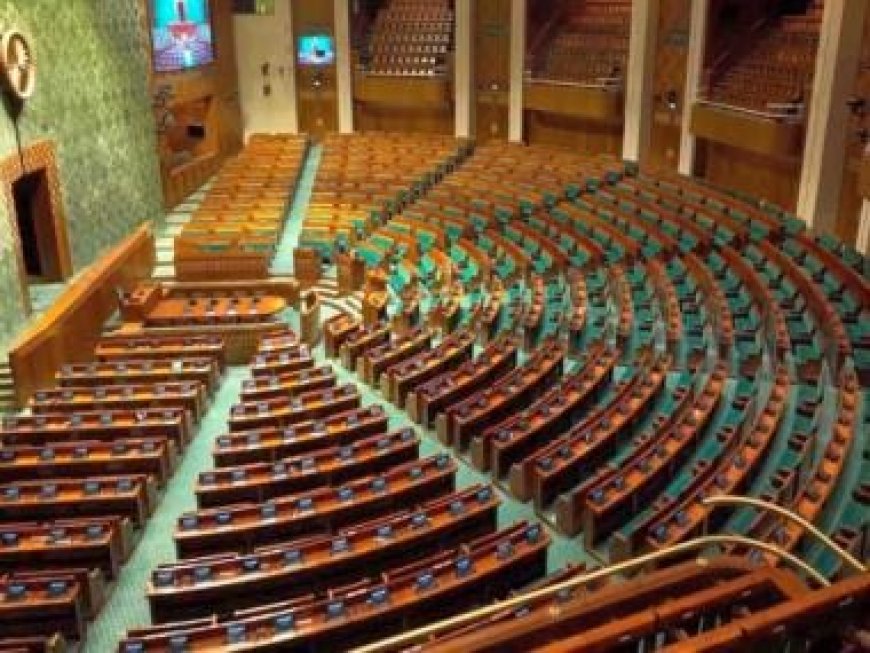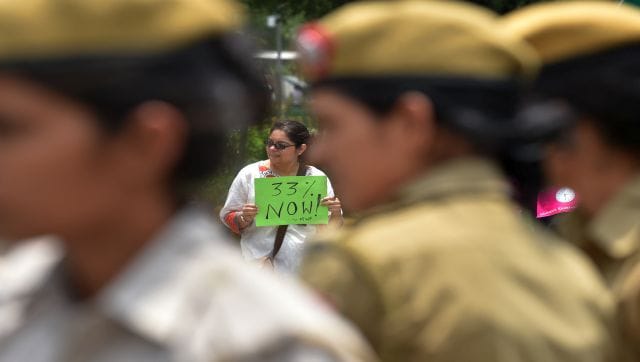Lok Sabha passes Women’s Reservation Bill, but 33% quota won’t be implemented until 2029. Here's why
Lok Sabha passes Women’s Reservation Bill, but 33% quota won’t be implemented until 2029. Here's why

The Lok Sabha on Wednesday passed the historic Women’s Reservation Bill.
The bill mandates 33 per cent reservation for women in the Lok Sabha and Assemblies of State and National Capital Territory of Delhi as well as provides a quota for SC/STs within the seats reserved for women.
It’s been a long road to get here.
A women’s reservation bill was originally introduced in Parliament 27 years ago by the then HD Deve Gowda government, passed by the Rajya Sabha a decade ago (bills that clear the Upper House do not lapse), and introduced by the BJP-led Centre nine years into the Narendra Modi government.
The bill, known as the Nari Shakti Vandan Adhiniyam, was the first legislative measure to be introduced by the government in the new Parliament building.
The development came came after Prime Minister Narendra Modi urged MPs to forget all past bitterness and begin a new chapter.
Speaking in the new Lok Sabha, he said: “Discussion on Women’s Reservation Bill happened for a long time. During Atal Bihari Vajpayee’s regime Women’s Reservation Bill was introduced several times but there was not enough majority to pass the Bill, and because of this this dream remained incomplete. Today, God has given me the opportunity to take this forward… Our Government is bringing a new Bill today on women’s participation in both Houses.”
Many hailed the Centre for introducing the legislation – a first in the new building – while others in the Opposition called it a “jumla (empty promise)” and a “huge betrayal” of women. This is because it may be a while before it can be implemented – even as long as 2029.
We examine what the legislation proposes and why its implementation will not happen anytime soon.
All about Nari Shakti Vandan Adhiniyam
The Nari Shakti Vandan Adhiniyam, formally known as The Constitution (One Hundred and Twenty-eighth Amendment) Bill 2023, introduced in the Lower House of Parliament clearly states, “as nearly as maybe, one-third (including the seats reserved for women belonging to the Scheduled Castes and Scheduled Tribes) of the total number of seats to be filled by direct election to the House of People shall be reserved for women”.
It proposes the same for Assemblies in the states and Delhi. And similar to the legislation that was passed in the Rajya Sabha in 2010, it mandates that the reservation will be for a period of 15 years from the date of commencement of the Act.
Also read: Women’s Reservation Bill in Lok Sabha: A look at its contentious history
The Bill also clearly states that the implementation of the legislation would only take place after the delimitation process.
It reads: “Notwithstanding anything in the foregoing provision of this Part or Part VIII, the provisions of the Constitution relating to the reservation of seats for women in the House of People, the Legislative Assembly of State, and the Legislative Assembly of the National Capital Territory of Delhi shall come into effect after an exercise of delimitation is undertaken for this purpose after the relevant figures for the first census taken after the commencement of The Constitution (One Hundred and Twenty-eighth Amendment) Bill 2023 have been published, and shall cease to have effect on the expiration of a period of 15 years from the date of such commencement.”
What this means is that the implementation of women’s reservation is now tied to a fresh census and delimitation exercise and effectively postpones the actual implementation of the “historic” measure to some unspecified date in the future.
Delimitation, census and women’s quotas
But what exactly is delimitation? How is it linked to the Census and how are these two activities linked to the Women’s Reservation Bill.
Delimitation is the process through which boundaries of parliamentary or Assembly constituencies are drawn. As per the Constitution, the number of seats allocated to each state in the Lower House of Parliament is dependent on its population. Hence, the populous state of Uttar Pradesh sends more representatives to Lok Sabha than any other state.
However, the Constitution calls for the reallocation of seats after every Census. In fact, the last such exercise was carried out after the 1971 Census and according to the Constitution 84th Amendment) Act, 2002 there is a freeze on readjustment of constituencies till the first Census after 2026.

If the Centre wishes to redraw the constituencies sooner, Article 82 will have to be amended – a move that the southern states are against.
Also read: Women’s Reservation Bill: A look at women’s participation in Parliament over the years
Now, as per what the government has said, the Census will take place in 2024 and the publication of numbers will take one or two years. It will be after this that the delimitation exercise is carried out – meaning the implementation of the Women’s Reservation Bill won’t happen before 2029.
‘Nothing but EVM’
After the Centre introduced the Bill in Lok Sabha, the Opposition dubbed it as “nothing but EVM – EVent Management” and a “gimmick aimed at making some noise”.
Congress’ Jairam Ramesh said, “In a season of election jumlas, this one is the biggest of them all. A huge betrayal of the hopes of crores of Indian women and girls.” He said the Modi government has not yet conducted the 2021 decadal Census making India the only country in G20 that has failed to carry out the Census. “Now it says that the reservation for women will come into effect only following the first decadal Census conducted after the Women’s Reservation Bill has become an Act. When will this Census take place?… Will the Census and delimitation be done before the 2024 elections?”
In a season of election jumlas, this one is the biggest of them all! A huge betrayal of the hopes of crores of Indian women and girls.
As we had pointed out earlier, Modi government has not yet conducted the 2021 Decadal Census making India the only country in G20 that has…
— Jairam Ramesh (@Jairam_Ramesh) September 19, 2023
Congress MP in Lok Sabha, Manish Tewari, also questioned the delay in the implementation of the legislation. “The 128th Constitution Amendment Bill is a betrayal of the women’s movement and their struggle for greater democratic representation in law and policy making. Clause 334 -A of the bill says reservation would come into effect post the first census after the bill becomes law & the DELIMITATION based upon that Census,” said Tewari.
He further wrote on X, “It is instructive to note that the Census due in 2021 has still not been held. Earliest Women’s reservation will become a reality in Parliament & Legislative Assemblies will be 2029 or even later. BRING WOMEN’s RESERVATION NOW, (sic).”
The Aam Aadmi Party (AAP)’s Atishi also criticised the bill, saying that the “devil lies in the detail”. She alleged that the bill was being used as a method to “fool women” across the country.
ये महिला आरक्षण बिल नहीं बल्कि 2024 के चुनाव से पहले महिला बेवकूफ बनाओ बिल है: आतिशी pic.twitter.com/lHZG3OZOKx
— NBT Hindi News (@NavbharatTimes) September 19, 2023
Rabri Devi of the Rashtriya Janata Dal (RJD) termed it as a “gimmick, aimed just at making some noise. Similarly, the Trinamool Congress (TMC) called it tokenism before the 2024 elections, alleging that the BJP was treating women of the country as a “vote bank”.
Senior state minister Chandrima Bhattacharya, who is also the president of the TMC’s women’s wing told news agency PTI, “We are all for any effort to empower women, but why was the bill introduced now? We apprehend this is nothing but tokenism by the BJP which is treating women as a vote bank. There is no certainty about its implementation, which will involve several formalities.”
With inputs from agencies
What's Your Reaction?



























































